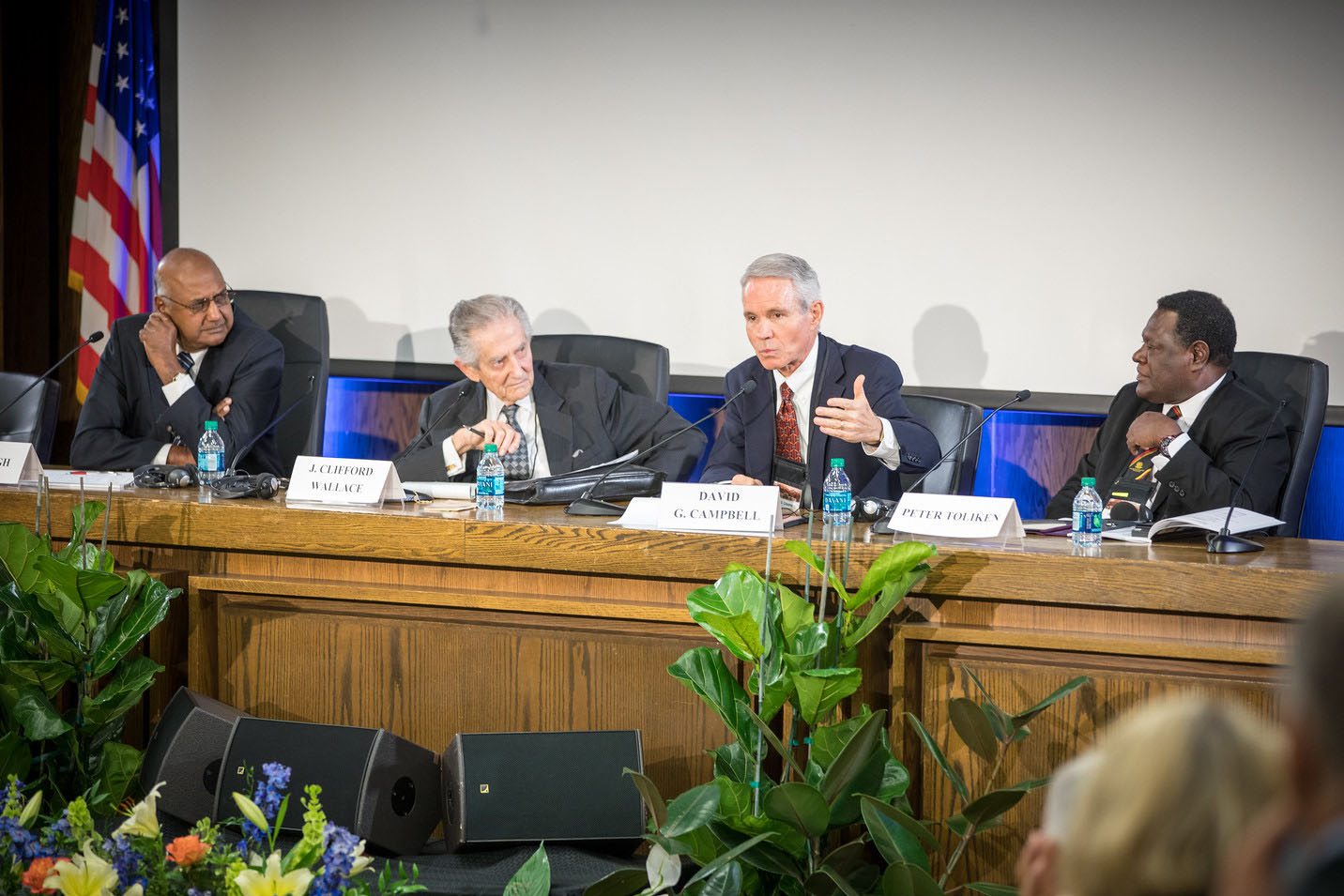Symposium 2017: Third Plenary: Religion and Rule of Law in a Changing World

by Alexander Alton, BYU Law Student and Symposium Volunteer
The third plenary session, entitled Religion and the Rule of Law in a Changing World, was held on Tuesday, October 3, 2017 and moderated by Judge Clifford Wallace, Emeritus Chief Judge of the U.S. Court of Appeals for the Ninth Circuit. The three panelists were Chancellor Carl Singh of the Court of Appeals in Guyana, Justice Peter Toliken of the Supreme and National Court of Justice in Papua New Guinea, and Judge David Campbell of the United States District Court for the District of Arizona.
One major topic of discussion amongst the judges was whether courts should act to level the playing field when there is a dominant church. Chancellor Singh commented that when the constitution provides for a secular state, like the constitution of Guyana, then the courts can intervene to prohibit the government’s support of a dominant church. However, he believes that if the constitution provides for a dominant religion, then it is not appropriate for the judiciary to try to break that down. Justice Toliken shared that, although freedom of religion and thought is entrenched in the constitution of Papua New Guinea, he believes that the judiciary in a constitutional democracy needs to remain neutral.
Judge Campbell explained that in most countries, judges are not law makers—the role of a judge is to apply and interpret the law, not to originate the law. In such a context, it does not fall on judges to level the playing field. Nevertheless, Judge Campbell suggested that judges can “give life” to certain provisions of law to help clarify and enforce those laws. Many countries have laws on the books that are meant to protect minority groups; but, those laws are not enforced. Many constitutional protections are written in very general language; judges can give meaning to these words to clarify their practical application in the lives of every day citizens. Judges also need to decide who prevails when the rights of one group come into conflict with the rights of another group. This gives judges the opportunity to level the playing field in favor of a minority group if it is within the law. Judge Campbell also shared his belief that judges have a responsibility to protect minority groups when it is within the law, and that the rule of law is most powerful when the citizens voluntarily accept the law and follow it.
The panel also discussed the views on proselyting in their respective countries. Chancellor Singh explained that Guyana’s constitution guarantees the freedom of association, freedom of speech, freedom of worship, and freedom of religion. Therefore, any state action seeking to impose restrictions on proselyting should be challengeable, and in a constitutional context, such laws should be condemned by the courts. Judge Campbell described how restrictions on proselyting has not been a problem in the United States. Instead, proselyting is a common, accepted practice. Judge Campbell remarked that in countries where restricting proselyting is a problem, it is usually a question of majority versus minority rights. He suggested that majorities generally don’t need protection because they can protect themselves; however, if a judge is protecting a minority group, then he/she is likely ruling against the government. In order to do this, the judge needs judicial independence, which allows a judge to rule against the government in favor of a minority, or to enforce minority rights against popular opinion. Justice Toliken shared that he is a Jehovah’s Witness and he proselytes. According to Justice Toliken, Papua New Guinea is a very accommodating country, and hospitality is a point of tremendous pride for the country. He noted that while their constitution does not permit persons to “attempt to force religion or irreligion on others,” proselyting rights have not been challenged in his country.
The session concluded with a brief question and answer period.